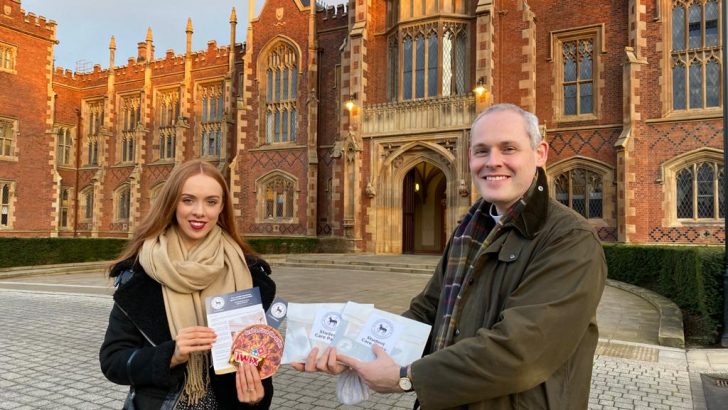The unseasonably gorgeous weather we’ve been enjoying of late signifies only one thing: The season of learning has once again returned. The transition from second to third level can often be the most unnerving; A larger student population, gargantuan campuses and choice, an embarrassment of choice.
The question of choice is no more apparent than in the very important choosing of which clubs and societies students carefully consider joining for the forthcoming academic year, or for some, the duration of their time at the institution.
The obvious few in high-demand usually encompass sport, film, politics and groups aligned with the gamut of identities and allegiances that seemingly matter so much to young people nowadays. Among that list of trendy clubs and societies, clubs concerned with religion or faith-matters would presumably be on the peripheries of popularity.
Countering
Countering this with emphasis is the Catholic Chaplaincy at Queen’s University Belfast, whose wide array of initiatives and focus on wholesome relationships in the Faith have resulted in a seismic increase in students registering to take part in Chaplaincy-related services for the forthcoming year, with over 71% of those identifying as Catholic in Queen’s committing to involvement in some form, representing a 60.9% rise when compared to last year’s figures.
Two members who are central to the operations of the Chaplaincy are Chaplain, Fr Dominic McGrattan and Director, Shannon Campbell. Both have amassed years of experience dedicated to campus ministry and are “encouraged” to see their efforts being recognised by young students who are gravitating to the Chaplaincy in increasing numbers.
Speaking to The Irish Catholic about the impressive figures, Fr McGrattan detailed that the Chaplaincy has noticed a continuous growth over the last five years but particularly in the last two and that this is largely down to the vast selection of initiatives the Chaplaincy offers to the inquisitive students entering the doors of the university for the first time.
105 of our core Chaplaincy members, by core I mean those who are checking in with us on a regular basis would be attending those Bible studies weekly”
“The number registered at Queen’s that have expressed their wish to receive Chaplaincy services would be in and around 7,500 out of a total student population of 25,000,” he said. “That’s an encouraging statistic and it’s experienced a year-on-year growth, probably over the past 5 years but considerably over the last two.
“We have a number of groups and societies providing input and contributing to our programme. Chief among them would be the small-group Bible studies that we offer to students. 105 of our core Chaplaincy members, by core I mean those who are checking in with us on a regular basis would be attending those Bible studies weekly and they’re introducing them to scripture, doctrine, encouraging them in Christian living and giving them opportunities to form wholesome friendships.
Active
“Beside that then, and these can often act as good entry points, we have a very active council of the Knights of Columbanus which effectively functions as our men’s group. We have a women’s group called ‘Blessed’, which is the female complement to the Knights. We have a very active choir which animates our liturgies but also contributes to the cultural life of the university. Of course the year is punctuated then with guest speakers, social events and charitable outreach. It’s fairly lively.”
Fr McGrattan notes that Catholicism has become something that is mostly unexplored in the lives of young people and this makes it something “fresher” when encountered, especially when they personally mightn’t have had any negative experiences with the Church in their lifetime.
This generation is not as culturally aware of Catholicism, they experience it as something that’s new and fresh and something they’re keen to know more about”
“Students are naturally curious and I think that this generation coming through are not encumbered by the conventions or even the baggage of earlier generations”, Fr McGrattan said. “They’re curious to find out more. The important thing about our offering is that it’s invitational and we find year-on-year an increase of students responding to that invitation with enthusiasm and generosity. Our experience here has been of an upward trajectory.
“I think that because this generation is not as culturally aware of Catholicism, they experience it as something that’s new and fresh and something they’re keen to know more about, become more involved in and to find more wholesome friendship circles that are supportive and that’s what they experience here.”
Director of the Chaplaincy, Shannon Campbell, first joined the Chaplaincy when she wasn’t even practising the Faith and this has spurred her commitment to welcome all into the Chaplaincy family, regardless of where they currently are on their own personal faith journey, as she is aware that faith can blossom in the most unexpected of circumstances.
“The first time I ever stepped foot into the Chaplaincy I wasn’t actually Catholic so I really learned the Faith at the Chaplaincy. One of the big things we say to students and try to emphasise is that this Chaplaincy is theirs, it’s what they’ve inherited from their grandparents or great-grandparents who paid for it and ultimately contributed to it in many ways,” Ms Campbell said.
Journey
“This is regardless of anything else or where people might be at on their faith journey, they’re still a part of this family and therefore we are here for you. So we make that effort to break the ice at an early stage because coming to university can be daunting in itself, especially when you don’t know anybody.”
Social life in university can be, according to Ms Campbell, “fleeting and temporary”, and a large proportion of students may only experiment with certain communities, movements and trends for a brief period during their university days without these aspects really leaving a formative imprint on their overall character and development. This is contrary to the life-affirming permanence of the Faith, which Ms Campbell believes offers something more “meaningful” and “lasting” when it is offered to budding adults searching for something more profound.
“Everything in university, or at least in the social side of the university context, is fleeting and temporary,” Ms Campbell said. “There is a realisation from students that there is something more meaningful here than what is being offered elsewhere in the Student’s Union, in the city centre and in other places on campus … there is something lasting here. Something that will give students meaning and their lives meaning. That is always going to be there and it’s not fleeting.
“Students in the Covid generation haven’t had it easy over the years and there are more and more pressures being thrust upon them from so many different directions and I think perhaps Church or at the very least groups associated with the Church community is a place where they can feel safe, at home and truly be themselves.”
The number one thing for me was friendship and community and the witness that those friends gave to the Faith”
Although Ms Campbell credits her embrace of the Catholic Faith to the Chaplaincy, what was most instrumental in her own journey wasn’t the talks or the guest lecturers facilitated by the Chaplaincy, although she enjoyed them, but strong emphasis on community and friendship that underpinned the student’s witness to the Faith.
“I am learning more and more every day,” Ms Campbell said. “Although I learned my Faith in the Chaplaincy and yes, guest lecturers, talks and Mass and all of those wonderful things were a really big influential part of why I did become Catholic in the end.
“But I would say that the number one thing for me was friendship and community and the witness that those friends gave to the Faith. They had a way about them that made me think that I wanted to be like that and have what they had and the joy they had. At no point did I ever feel like they were trying to convert or evangelise me I was just totally in awe of their Christ-centred joy and the witness that they were giving on campus. So community and relationships can be really transformative for a student.”


 Brandon Scott
Brandon Scott Queen’s University Belfast Catholic Chaplaincy pastoral manager Shannon
Campbell and chaplain Fr Dominic McGrattan outside the Lanyon Building.
Queen’s University Belfast Catholic Chaplaincy pastoral manager Shannon
Campbell and chaplain Fr Dominic McGrattan outside the Lanyon Building. 